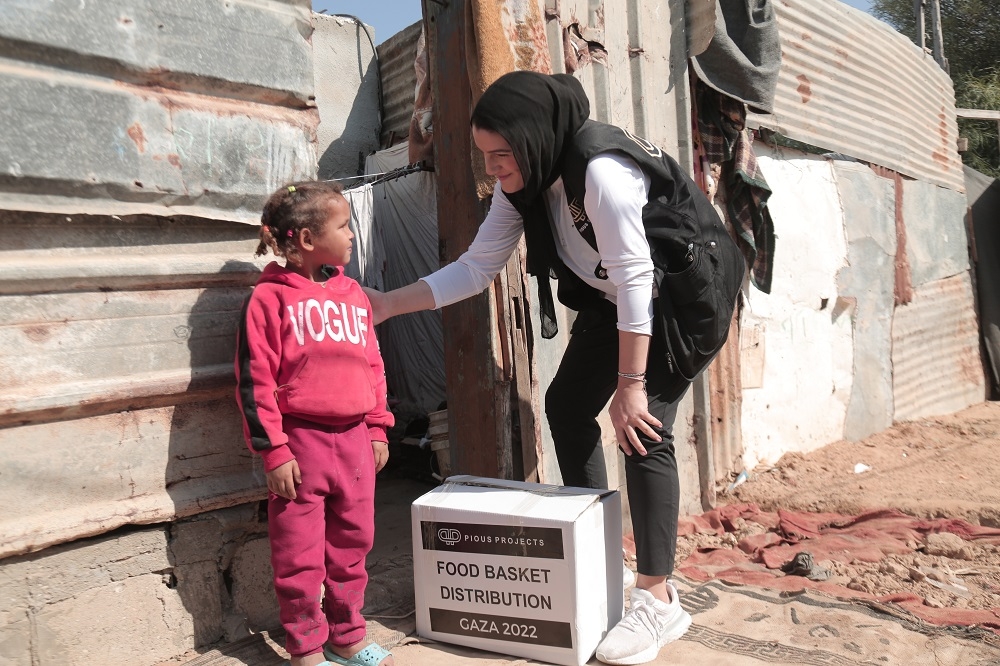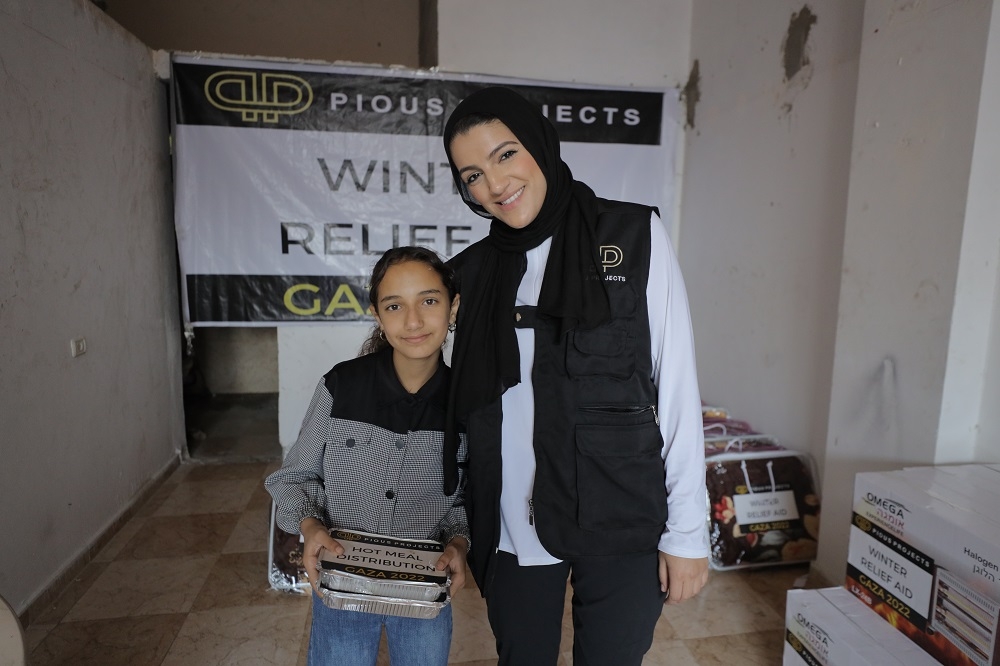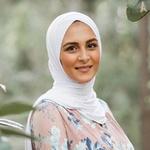Pious Projects' Jumana El-Ammori Believes Charity Work & Volunteering is Key to Our Humanity
Community
|
Nov 23, 2023
|
7 MIN READ

Jumana El-Ammori takes a photo with Gazan children in 2022 when she visited the region with Pious Projects.
Editorial note: All this month we are focusing on the stories of Muslim women working in charity, whether as the head of some charitable organization, doing volunteer work or anything in between. We are exploring what drives these women to give of themselves to others, how they balance that in their lives and what advice they have to encourage others to take up work to help those in need. To donate to Pious Projects, click here.
If you’re like me, it is always hard to sift through where my donations are going when deciding on a charity. A lot of relief aid organizations seem to spend a lot of time and money on PR, fundraising dinners and administration. Like many, I’ve been trying to zero in on organizations that are delivering aid to Palestine and, specifically, Gaza.
Pious Projects’ “100% impact with 0% admin fees” tagline immediately caught my eye, and just by a quick glance at their website and social media accounts (Instagram | Facebook) I could tell that this small organization operated differently than others I’ve seen in so many ways. I had to learn more, and spoke with Jumana El-Ammori, the Program Director at Pious Projects, about her work and journey.
Dedicating one’s time and energy to charitable work doesn’t come easy. Jumana shares with me how she started with Pious Projects, what motivates her, and where the work takes her.
How did you start with Pious Projects?
I’ve been with Pious for over six years now. I started as a volunteer after seeing the impact my donation made. In Ramadan of 2015, I came across a Pious video that showcased the living conditions in Mali and how the charity builds water wells to help locals access clean,drinkable water. I took all my money after graduation and put it into a water well.

Pious Project Program Director Jumana El-Ammori with a young girl in Gaza in 2022.
The video that I was sent once the well was made and being used was very impactful. I got emotional at how just one donation made a world of a difference in someone’s life. I wanted to do more. I took it upon myself to raise more money in my local community from family and friends to donate towards various Pious Projects, such as mosques, schools and water wells.
I started as a full time administration coordinator doing all the back-end office work by myself. I was the only employee for about a year and worked my way up to my [current] role, which is program director. We started it off with one million donations per year, and now we receive over ten million. It’s very fulfilling to see our growth as a small organization.
How did Pious Projects come about?
We started with a small group of volunteers who are now on the board. One of the local businessmen, who has a lot of connections in the local community, started projects around the Chicago, Bridgeview area. He then got connected on the ground in Mali. In 2015 he took a trip and saw for himself the situation of the locals and how their daily life is a struggle. He decided to post what he saw online and Pious Projects flourished from there.
We started from Mali and now have campaigns and impact [in] over 15 countries, including orphan support to over ten countries.
How do you keep overhead so incredibly low?
The founder has been gracious enough to let us use his office location for free. All our utilities, parking and rent [are] covered, which frees up our administration expenses. Because of this, we rely on donations to [fund] our administrative [costs] to help keep Pious Projects running. We’ve seen that when given the voluntary option to add on an admin tap, we almost always receive the extra funds instead of having to use a portion of your initial donation to cover costs.
Pious Projects on the Ground in Gaza.

Jumana in Gaza last year with Pious Projects.
I was scheduled to be in Gaza this year in October. Alhamdulillah, I was able to go last year and see how meaningful our work is on the ground. We are doing something that is unimaginable by many people. To be able to slaughter fresh meat and pass it out to families who haven’t been able to afford to eat it in a long time, to see the joy in their faces, it changes something in you. This year we were scheduled to be on the ground to work on our 15 programs that were scheduled, obviously that didn’t happen.
Right now we have three teams on the ground, two in the north and one in the south. A big part of why we are able to deliver directly to people in Gaza is because we have an amazing team on the ground in Gaza. They are born and raised there and are committed to delivering and serving their community. With their help, we are able to buy supplies within Gaza. They help us source local suppliers, are able to get the best deals and materials, and can distribute directly to those affected. We have been working in Gaza since 2018, which is why we have been able to purchase from suppliers and have our own facilities that contain our stock and emergency aid.
Our programs include winter clothes and essential drives, food parcels, hot meals, hygiene kits and mental rehab programs. Especially during times of war on Gaza, we are always checking in on our team to make sure they are safe, alive, and if they are able to work. During these difficult times, they are always available and feel like this is their duty to their community and country rather than a job.
It’s amazing that they are able to deliver hot meals in the middle of bombings. It’s a blessing to be able to work with them. We are all feeling this way right now, because our supplies are running low and sourcing materials is difficult. Generally speaking North Gaza is wealthier than the south. A lot of resources come from the north, but this has slowed down due to the current situation especially with regards to food parcels.
From the beginning [of the war on Gaza], it [has been] very hard to carry on with our work in the region because the north is a high clashing area. Our team traveled south, and now our aid is mainly in southern Gaza. You have to keep in mind that we are one small team in Gaza, so we distribute as much as we can. We reach 10,000 people per day, but there are 2.2 million people in Gaza. Unfortunately what we see and hear from people on the ground is accurate, the majority of the population are not receiving the aid it needs. I encourage everyone to check out UNOCHA for the most factual daily updates.
Of course, right now the water crisis is huge. Over the years we have built 20 water desalination plants in Gaza. They are all solar powered and don't rely on electricity. The solar energy charges batteries, [which in turn] enables them to operate even when the sun goes down. These plants pump water from the ground. Through this system we have been able to deliver water to those seeking safety in UNRWA schools and anyone our team can reach. We also deliver water on tanks, but right now anything moving on wheels is a target, so we are depending on providing clean water through our water wells.
Impact and Programs Around the World

Pious Projects in Gaza in 2022.
Since day one, our water wells have been our main focus. We started in Mali and now have over 4,000 water wells there. This has been huge, to see the difference 10 million dollars can make in terms of bringing clean fresh water to those in need. We have been able to bring clean water to a third of the country, Alhamdulilah. In Yemen we have done medical missions, like restorative eye surgeries.
The videos we receive of the recipients and how our programs are able to change their lives – it’s very humbling. At Pious Projects, we take it as a responsibility to take care of each other, not just in our own native countries but those around us as well.
What is your advice to others on charity work and getting involved?
I never expected to have a position at Pious; I was just a volunteer to start. Now I can never see myself at a corporate job. I highly encourage everyone to spend time volunteering. We’ll all be better for it. Our lives get busy, and we forget to give back to our communities. Even beyond our communities, I encourage others to see what charities are doing overseas and how they can volunteer with them.
[Start] by putting your foot in as a volunteer, even if you have a career outside this type of work. It’s important to give back. Push yourself as a woman. We are capable of a lot of things. We are able to do so much, and there are endless possibilities.
Haute Hijab will be donating a portion of all sales on #GivingTuesday this year to Pious Projects.
Subscribe to be the first to know about new product releases, styling ideas and more.
What products are you interested in?


